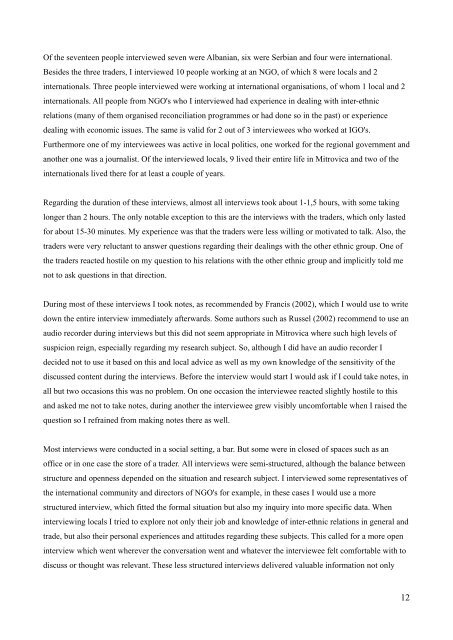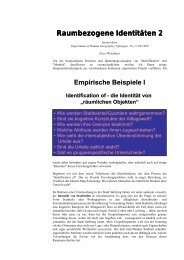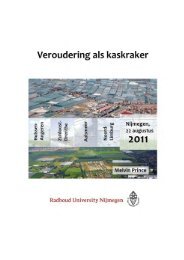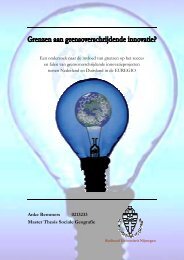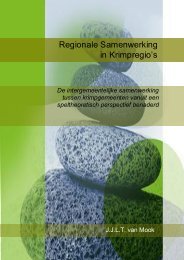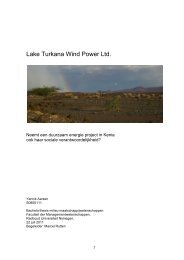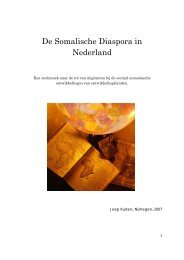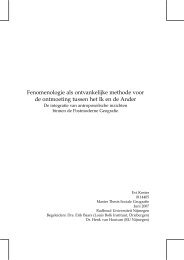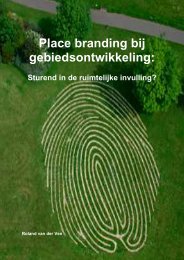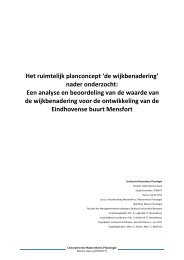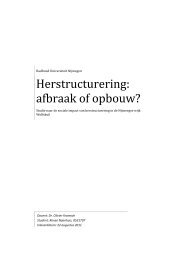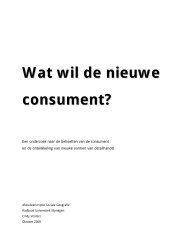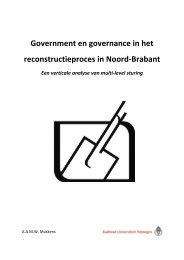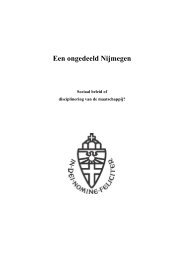Trading with the enemy in Mitrovica, Kosovo. - RUhosting
Trading with the enemy in Mitrovica, Kosovo. - RUhosting
Trading with the enemy in Mitrovica, Kosovo. - RUhosting
You also want an ePaper? Increase the reach of your titles
YUMPU automatically turns print PDFs into web optimized ePapers that Google loves.
Of <strong>the</strong> seventeen people <strong>in</strong>terviewed seven were Albanian, six were Serbian and four were <strong>in</strong>ternational.<br />
Besides <strong>the</strong> three traders, I <strong>in</strong>terviewed 10 people work<strong>in</strong>g at an NGO, of which 8 were locals and 2<br />
<strong>in</strong>ternationals. Three people <strong>in</strong>terviewed were work<strong>in</strong>g at <strong>in</strong>ternational organisations, of whom 1 local and 2<br />
<strong>in</strong>ternationals. All people from NGO's who I <strong>in</strong>terviewed had experience <strong>in</strong> deal<strong>in</strong>g <strong>with</strong> <strong>in</strong>ter-ethnic<br />
relations (many of <strong>the</strong>m organised reconciliation programmes or had done so <strong>in</strong> <strong>the</strong> past) or experience<br />
deal<strong>in</strong>g <strong>with</strong> economic issues. The same is valid for 2 out of 3 <strong>in</strong>terviewees who worked at IGO's.<br />
Fur<strong>the</strong>rmore one of my <strong>in</strong>terviewees was active <strong>in</strong> local politics, one worked for <strong>the</strong> regional government and<br />
ano<strong>the</strong>r one was a journalist. Of <strong>the</strong> <strong>in</strong>terviewed locals, 9 lived <strong>the</strong>ir entire life <strong>in</strong> <strong>Mitrovica</strong> and two of <strong>the</strong><br />
<strong>in</strong>ternationals lived <strong>the</strong>re for at least a couple of years.<br />
Regard<strong>in</strong>g <strong>the</strong> duration of <strong>the</strong>se <strong>in</strong>terviews, almost all <strong>in</strong>terviews took about 1-1,5 hours, <strong>with</strong> some tak<strong>in</strong>g<br />
longer than 2 hours. The only notable exception to this are <strong>the</strong> <strong>in</strong>terviews <strong>with</strong> <strong>the</strong> traders, which only lasted<br />
for about 15-30 m<strong>in</strong>utes. My experience was that <strong>the</strong> traders were less will<strong>in</strong>g or motivated to talk. Also, <strong>the</strong><br />
traders were very reluctant to answer questions regard<strong>in</strong>g <strong>the</strong>ir deal<strong>in</strong>gs <strong>with</strong> <strong>the</strong> o<strong>the</strong>r ethnic group. One of<br />
<strong>the</strong> traders reacted hostile on my question to his relations <strong>with</strong> <strong>the</strong> o<strong>the</strong>r ethnic group and implicitly told me<br />
not to ask questions <strong>in</strong> that direction.<br />
Dur<strong>in</strong>g most of <strong>the</strong>se <strong>in</strong>terviews I took notes, as recommended by Francis (2002), which I would use to write<br />
down <strong>the</strong> entire <strong>in</strong>terview immediately afterwards. Some authors such as Russel (2002) recommend to use an<br />
audio recorder dur<strong>in</strong>g <strong>in</strong>terviews but this did not seem appropriate <strong>in</strong> <strong>Mitrovica</strong> where such high levels of<br />
suspicion reign, especially regard<strong>in</strong>g my research subject. So, although I did have an audio recorder I<br />
decided not to use it based on this and local advice as well as my own knowledge of <strong>the</strong> sensitivity of <strong>the</strong><br />
discussed content dur<strong>in</strong>g <strong>the</strong> <strong>in</strong>terviews. Before <strong>the</strong> <strong>in</strong>terview would start I would ask if I could take notes, <strong>in</strong><br />
all but two occasions this was no problem. On one occasion <strong>the</strong> <strong>in</strong>terviewee reacted slightly hostile to this<br />
and asked me not to take notes, dur<strong>in</strong>g ano<strong>the</strong>r <strong>the</strong> <strong>in</strong>terviewee grew visibly uncomfortable when I raised <strong>the</strong><br />
question so I refra<strong>in</strong>ed from mak<strong>in</strong>g notes <strong>the</strong>re as well.<br />
Most <strong>in</strong>terviews were conducted <strong>in</strong> a social sett<strong>in</strong>g, a bar. But some were <strong>in</strong> closed of spaces such as an<br />
office or <strong>in</strong> one case <strong>the</strong> store of a trader. All <strong>in</strong>terviews were semi-structured, although <strong>the</strong> balance between<br />
structure and openness depended on <strong>the</strong> situation and research subject. I <strong>in</strong>terviewed some representatives of<br />
<strong>the</strong> <strong>in</strong>ternational community and directors of NGO's for example, <strong>in</strong> <strong>the</strong>se cases I would use a more<br />
structured <strong>in</strong>terview, which fitted <strong>the</strong> formal situation but also my <strong>in</strong>quiry <strong>in</strong>to more specific data. When<br />
<strong>in</strong>terview<strong>in</strong>g locals I tried to explore not only <strong>the</strong>ir job and knowledge of <strong>in</strong>ter-ethnic relations <strong>in</strong> general and<br />
trade, but also <strong>the</strong>ir personal experiences and attitudes regard<strong>in</strong>g <strong>the</strong>se subjects. This called for a more open<br />
<strong>in</strong>terview which went wherever <strong>the</strong> conversation went and whatever <strong>the</strong> <strong>in</strong>terviewee felt comfortable <strong>with</strong> to<br />
discuss or thought was relevant. These less structured <strong>in</strong>terviews delivered valuable <strong>in</strong>formation not only<br />
12


